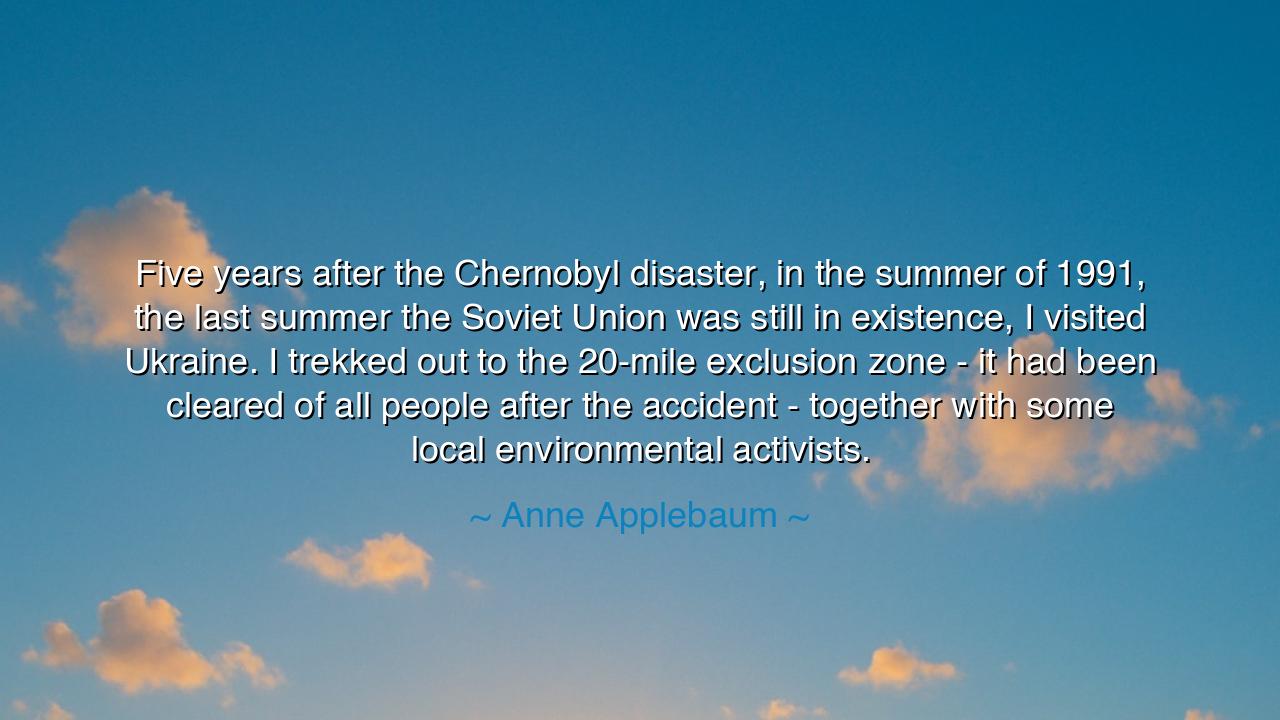
Five years after the Chernobyl disaster, in the summer of 1991
Five years after the Chernobyl disaster, in the summer of 1991, the last summer the Soviet Union was still in existence, I visited Ukraine. I trekked out to the 20-mile exclusion zone - it had been cleared of all people after the accident - together with some local environmental activists.






Hear the words of Anne Applebaum, who bore witness to both history and silence: “Five years after the Chernobyl disaster, in the summer of 1991, the last summer the Soviet Union was still in existence, I visited Ukraine. I trekked out to the 20-mile exclusion zone – it had been cleared of all people after the accident – together with some local environmental activists.” Within these words lies not only the memory of a place scarred by tragedy, but also a parable for the ages: that human pride can wound the earth, that silence can follow recklessness, and that the ruins of folly stand as warnings to those yet to come.
The Chernobyl disaster was no mere accident of machines; it was a moment when fire and poison spilled into the air, when the arrogance of unchecked ambition met the fragility of nature. In 1986, the reactor’s explosion carried death on the wind, invisible yet deadly, sowing sickness across lands and generations. The exclusion zone, emptied of voices and footsteps, became a monument to catastrophe: a living desert in the midst of fertile soil, a city abandoned where children once played, a shrine to both the power and the peril of human invention.
Applebaum’s journey into this emptiness, accompanied by environmental activists, is more than travel—it is pilgrimage. To walk into the zone is to stand in the presence of absence, to feel the weight of lives uprooted, to hear in the silence the echo of warnings. The 20 miles of desolation were not barren by nature’s will, but by man’s mistake. This is the origin of her quote: to record what remains when pride and secrecy collide with the untamed forces of the natural world.
History has long warned of such hubris. Recall the tale of Pompeii, swallowed in fire and ash when Vesuvius erupted. The people had built their homes and temples near the mountain, never believing it would betray them. Yet the earth remembers its own strength, and those who ignore it suffer. Chernobyl was another such reminder, not of mountain fire but of nuclear flame, not of natural eruption but of human error. Both teach that no matter how advanced, man remains bound to the laws of creation.
The last summer of the Soviet Union, when Applebaum made her journey, carries its own symbolism. An empire that once claimed mastery over vast lands was crumbling, its strength hollow, its legacy marred by silence and lies. Chernobyl stood as both a physical wound and a metaphorical one: the poisoning of land and trust, the collapse of a system that prized secrecy over truth. Her journey was thus not only through an exclusion zone, but through the ruins of an ideology that believed itself unshakable.
From her words we learn that memory is sacred. The ruins of Chernobyl, like the ruins of ancient cities, are not to be forgotten. They are teachers. They remind us that progress without responsibility is peril, that power without wisdom leads to devastation. To see such ruins is to vow that the mistakes of the past will not be repeated—that new generations will walk with humility, with care for the earth, and with respect for truth.
Practical action flows from this teaching. We must demand transparency from those who hold power, for silence can kill as surely as radiation. We must support the guardians of the earth—the activists, the scientists, the watchful citizens—who remind us that stewardship is our duty. We must cultivate energy and progress with foresight, never forgetting that every invention carries both promise and peril. And in our personal lives, we must walk as caretakers, not conquerors, of the land entrusted to us.
Thus, Applebaum’s words endure as more than a recollection of a journey. They are a torch passed to us: that we may see in the emptiness of Chernobyl the cost of arrogance, that we may walk more wisely in our time, and that we may ensure the silence of abandoned places does not become the inheritance of our children. For the earth remembers—and it is we who must learn.






AAdministratorAdministrator
Welcome, honored guests. Please leave a comment, we will respond soon